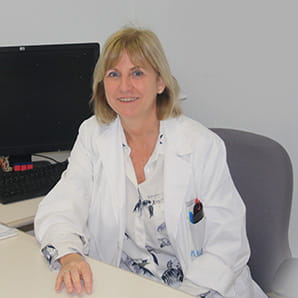
Introducing a sepsis screening protocol with PCT as a standard parameter
Introducing a sepsis screening protocol with PCT as a standard parameter
In Hospital Universitario Doctor Peset, a large referral hospital in Valencia, Spain, the introduction of a sepsis screening protocol with procalcitonin (PCT) as a standard parameter has reduced mortality and ICU admissions.
In the Internal Medicine Unit alone, spending on antibiotics has been reduced by 30 %.
“The ease of use of the Radiometer AQT90 FLEX analyser has freed up resources in the department for other tasks. The analyser requires less space, fewer consumables, and very limited maintenance compared to other Procalcitonin measurement systems.
Furthermore, the device has built-in quality control procedures that detect immediate errors during each measurement and a system check for regularly monitoring the system status. This ensures that the analyser works accurately and precisely,” says Dr Nuria Estañ Capell, Head of the Clinical Analysis Department.
Valencia is one of the most innovative laboratories in Spain.
Thanks to the Head of the Clinical Analysis Department, Dr Nuria Estañ Capell, pre-analytical, analytical and post-analytical processes have been incorporated in an automated chain, significantly improving response times.
The automation has also led to a reduction of routine stock and inventory tasks, freeing up resources for other tasks.
The ease of use of the Radiometer AQT90 FLEX analyser has freed up resources in the department for other tasks. It requires less space, fewer consumables, and very limited maintenance compared to other Procalcitonin measurement systems.
- Dr Nuria Estañ Capell, Head of the Clinical Analysis Department
The AQT90 FLEX PCT assay
The AQT90 FLEX analyser played an important role in the reorganisation of the laboratory. With the AQT90 FLEX analyser, blood samples do not need to be handled after collection.
The previous processes could sometimes lead to pre-analytical errors with serious consequences to the patient and/or danger to the health of the operator due to the biological risk associated with handling blood samples.
The analyser can measure procalcitonin in 21 minutes, which makes it an effective tool in the early detection of sepsis and septic shock.
“We have taken part in a European study comparing the AQT90 FLEX analyser to the B·R·A·H·M·S® KRYPTOR®, which is considered the gold standard, and the system we had previously,” says Dr Estañ.
Although the two methods are comparable in terms of reliability, waiting time and cost, the Radiometer solution was the one chosen by Dr Estañ’s department.
“It is simpler, takes up much less space, uses very few consumables, and requires very little maintenance. Furthermore, the device has built-in quality control procedures that detect immediate errors during each measurement and a system check that regularly monitors the system status. This ensures that the analyser works accurately and precisely.”
The head of the department reckons that any member of the laboratory staff can easily use the AQT90 FLEX analyser by consulting the guide uploaded to the hospital intranet.
An additional deciding factor in selecting Radiometer was the reliability on local technical support. This means that breakdowns can be addressed quickly, thereby avoiding long downtime periods when the analyser is not available. This factor is extremely important for a hospital like Doctor Peset where “Code Sepsis,” a screening protocol for sepsis, has been implemented.
The sepsis screening protocol
The protocol was jointly agreed by various departments in 2012 for the early treatment of sepsis and includes, among other parameters, PCT as a standard screening test.
The Hospital Universitario Doctor Peset was the second in Spain to implement this system, which is monitored by the pioneering Hospital Son Llàtzer in Palma de Mallorca.
“It began in the emergency department and was eventually extended to the whole hospital. In our case, we have a nursing resource to coordinate the program,” explains Dr Estañ.
When there is a positive result for sepsis, an alarm is activated within the computerised system so that the patient can be given antibiotic treatment as a matter of urgency.
- Dr Nuria Estañ Capell, Head of Clinical Analysis Department
Results with implementation of “Code Sepsis”
During the first year after Code Sepsis was introduced, mortality and ICU admissions due to sepsis decreased, as well as the administration of unnecessary antibiotics, preventing the development of multi-resistant bacteria and hospital-acquired infections.
“At the University Hospital Doctor Peset, we have three daily admissions for sepsis, i.e. about 1,000 patients per year, and the mortality rate in 2012 was 24 % below the national average of 33 %. After the activation of the Code Sepsis, we have managed to reduce the mortality rate to 17 % in 2016.
The new approach has, unsurprisingly, also had an effect on the hospital’s costs. “In the Internal Medicine Unit alone, spending on antibiotics has been reduced by 30 %,” says Dr Estañ.
Cookies are used on this website
Use of cookiesPlease enter a valid email
We will be sending an e-mail invitation to you shortly to sign in using Microsoft Azure AD.
It seems that your e-mail is not registered with us
Please click "Get started" in the e-mail to complete the registration process
Radiometer is using Microsoft AZURE Active Directory to authenticate users
Radiometer uses Azure AD to provide our customers and partners secure access to documents, resources, and other services on our customer portal.
If your organization is already using Azure AD you can use the same credentials to access Radiometer's customer portal.
Key benefits
- Allow the use of existing Active Directory credentials
- Single-sign on experience
- Use same credentials to access future services
Request access
You will receive an invitation to access our services via e-mail when your request has been approved.
When you accept the invitation, and your organization is already using AZURE AD, you can use the same credentials to access Radiometer's customer portal. Otherwise, a one-time password will be sent via e-mail to sign in.

